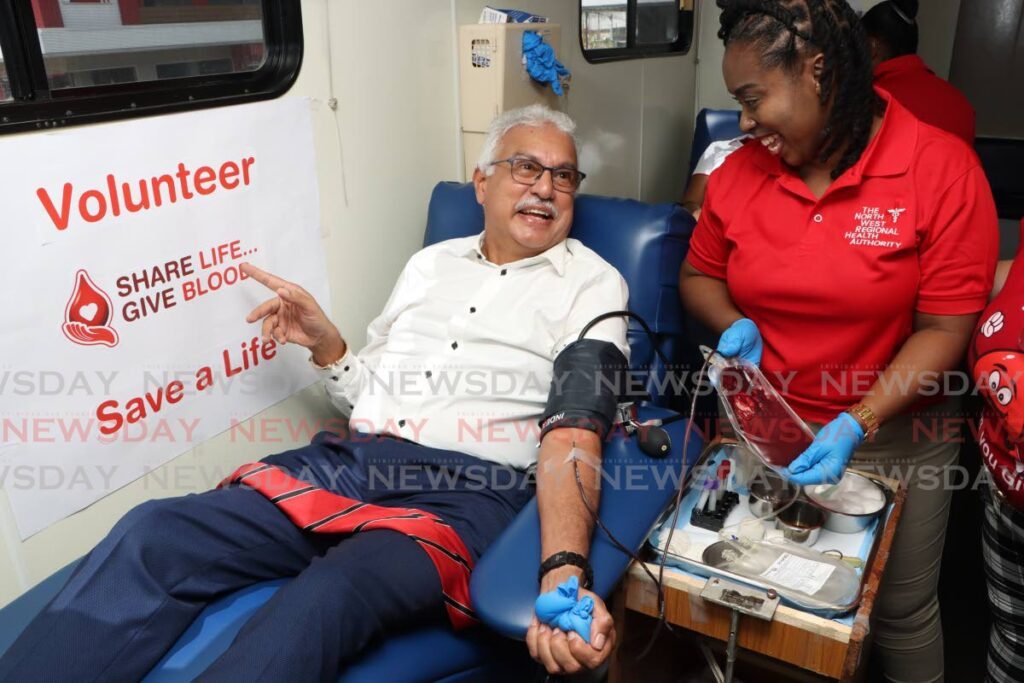Trinidad and Tobago working to deal with NCD scourge

UP TO 2004, non-communicable diseases (NCDs) accounted for over 60 per cent of all deaths in Trinidad and Tobago, and has been the leading cause of death in this county for the last 20 years, according to the Pan American Health Organization (PAHO).
According to the Ministry of Health’s 2015 Hospital Utilisation Reports, that year, 25 per cent of deaths were due to heart disease, 14 per cent to diabetes, 13 per cent to cancer and ten per cent to cerebrovascular disease (conditions that affect blood flow to the brain).
And, according to the International Diabetes Foundation, in 2021 there was a 14.8 per cent prevalence of diabetes in adults in TT.
With these startling statistics in mind, the Ministry of Health has been taking steps to educate the public, lower the risk of people contracting NCDs by promoting a healthy lifestyle, provide quality care for the management of NCDs and their risk factors, and collect data to better inform policies.
Dr Marla Clapperton, director of the ministry's Non-Communicable Diseases Unit, spoke to Newsday earlier this month about some of the programmes implemented to help save lives.
TTMoves is the ministry’s main educational tool and its public advice were to drink more water, move more, eat more fruits and vegetables daily and, recently added – know your health numbers ie blood pressure, blood sugar and cholesterol.
Launched in 2018, the campaign hosted 5K walks/runs, provided healthy lifestyle information at health fairs and festivals as well as online, installed sporting and exercise equipment at community centres and schools, and much more.
Recently, TTMoves has been expanding to include an app which, for now, is step counter, a fitness programme on television and a programme for primary school students.
Clapperton explained Get Moving with TTMoves is a ten-minute fitness programme starting at 6.45 am on ttt. The six-week programme started on June 3 and a new routine is introduced each week.
She said it is designed to be very simple but effective and caters for all age groups, levels of fitness, as well as for those with disabilities.
TTMoves Junior was launched in April and hosted an NCD Inspector Academy during the Easter vacation. It was held in all the regional health authorities (RHAs) for children aged five to 11.
The the children learned about healthy eating, gardening, and improving and increasing their physical activity. Based on the availability and resources of the RHAs, some academies had yoga, dance and went on field trips. At the end, they graduated and received a certificate and a sticker booklet.
Positive feedback
“When they go back home they were to share what they learned, in terms of healthy lifestyle practices, with their friends, families and neighbours. And anyone caught not doing the healthy practices they have learned, the NCD inspectors could issue sticker fines to them.
“This fun activity was really built on the premises of children being agents for change. We are investing in the younger generation.”
She said the feedback on the academy was very positive and RHAs have asked the ministry to repeat the activity.
Speaking to members of the media after a World Blood Donor day event on the Brian Lara Promenade, Port of Spain, on June 14, Health Minister Terrence Deyalsingh said citizens, especially those in selected target groups, were listening to the ministry’s messages on NCDs.
He said that about two years ago the ministry started a diabetes in pregnancy programme. Now, all pregnant women are screened for NCDs and health facilities are starting to see more pregnant women whose diabetes are under control.
The ministry also started a programme called Hearts for people who were hypertensive. He said that at the end of July 2023, 37 per cent of those enrolled in Hearts were controlled or had a blood pressure of 140/90 and below. By December, the control rate went up to 48 per cent.

“So between diabetes and hypertension, which are the two big NCDs, we have seen great progress,” said Deyalsingh.
“Anecdotally, I am seeing many more people drinking water, many more people walking around with their water bottles, and that is good. I am seeing more and more people in savannahs playing. I’m seeing more children playing, which is one of my pet peeves – that children don’t play enough. So the messages are getting through and I’m grateful for that.”
No data, no info
There is a distinct lack of recent data about NCDs in TT but Clapperton said the ministry is working to address this.
She said the last PAHO/WHO (World Health Organization) Non-Communicable Diseases Prevalence and Risk Factor Survey (STEPS) took place in 2011, but another was launched on April 15 and is ongoing across the country.
About 70 field staff from the ministry are going door-to-door dressed in high-visibility vests with the Ministry of Health and STEPS logos, and carrying MoH identification, to conduct the national STEPS survey. The hope was to get around 5,400 participants.
The steps of the survey include demographic and behavioural measurements using a questionnaire, physical measurements plus pulse and blood pressure, and biochemical measurements.
She said the ministry also included a module for mental health screening which was being used for the first time in the Americas.
All the data collected will be strictly confidential but the participant will be given a patient information sheet with a summary of their readings. If the readings were suspect, the form could be taken to their doctor or the nearest health facility so they could be advised accordingly.
“In order to better manage, we need to measure. This survey is a way for us to get a better understanding of what NCD risk-factors are prevalent within our population.
“It will give us an overall picture of an individual's health status that we can further analyse to get information on prevalence of illnesses, such as diabetes and hypertension, within our population and have further information on cardiovascular risk – risks for heart attacks and strokes. As you can imagine, this is very important as it can help inform and guide moving forward.”
As mentioned by Deyalsingh, the ministry was also collecting data through the Hearts programme at all health centres. Participants were those who attended the Chronic Disease Clinic at local heath centres and whose blood pressure was over 140/90.
The Hearts programme, a treatment protocol, collects data on the levels of blood pressure control in those enrolled in the programme.
Clapperton said that at the end of June 2023, 37 per cent of the 57,544 enrolled in the programme had control over their blood pressure. By the end of December 2023, there were 66,377 participants and the control rate was 48 per cent.
In the pilot phase, being testing at 50 sites, was the NCD registry project in which data on the number of people who attended the Chronic Disease Clinics with diabetes and hypertension were recorded.
Training is key
“In the long run, when we’re out of the pilot phase and we’ve scaled up to the 105 sites, we’ll be able to have more real-time data.
“The registry gives us information on people in the public system who already know their diagnosis while surveillance, like the STEPS survey, is broader. Surveillance is how we will be able to assess any trends, any changes, and the impact of any programmes and interventions we would be making.
“So the data in terms of prevalence for NCDs, we would have this from the national STEPS survey conducted in 2011. In terms of more up-to-date figures, we are awaiting the completion of the 2024 iteration of the STEPS survey.”
Training has also been a key part of the ministry’s process.
Clapperton told Newsday that since March 25, the ministry had been conducting a series of NCD primary health care symposiums which provides continuing medical education to primary care physicians and nurses.
So far, 325 primary care health care workers in the Eastern, South West and Tobago RHAs have been retrained in NCD-related topics including the management of asthma, hypertension and diabetes, smoking and alcohol cessation, screening for depression, common skin conditions, digital rectal examinations, clinical breast exams and more.
“In insuring that quality care is delivered at primary care level, we have to make sure the personnel are up-to-date with their training.”
In January, she said, a national foot screening tool was distributed to all RHAs to be used in chronic disease clinics at health centres and district health facilities. They were to be used annually on diabetics to help pick up any foot complications of diabetes.
“As you can imagine this would be to have early detection and prevent further progression to foot ulcerations and limb amputation. This will be part of the Diabetes Wellness Clinic as well.
“Once patients are seen utilising this tool and foot complications due to diabetes are detected, it also includes the treatment and referral pathway for these people who would have been further categorised as mild, moderate or severe.”
Clapperton said an Inter-American Development Bank (IDB) article, published in 2017, estimated this country’s annual economic NCD burden to be around US$1.19 billion ($8 billion) or 4.3 per cent of GDP, including loss of productivity.
She said a lot of the ministry’s NCD programmes including the Inspector Academy and the STEPS survey, was covered by a loan facility from the IDB.

Comments
"Trinidad and Tobago working to deal with NCD scourge"